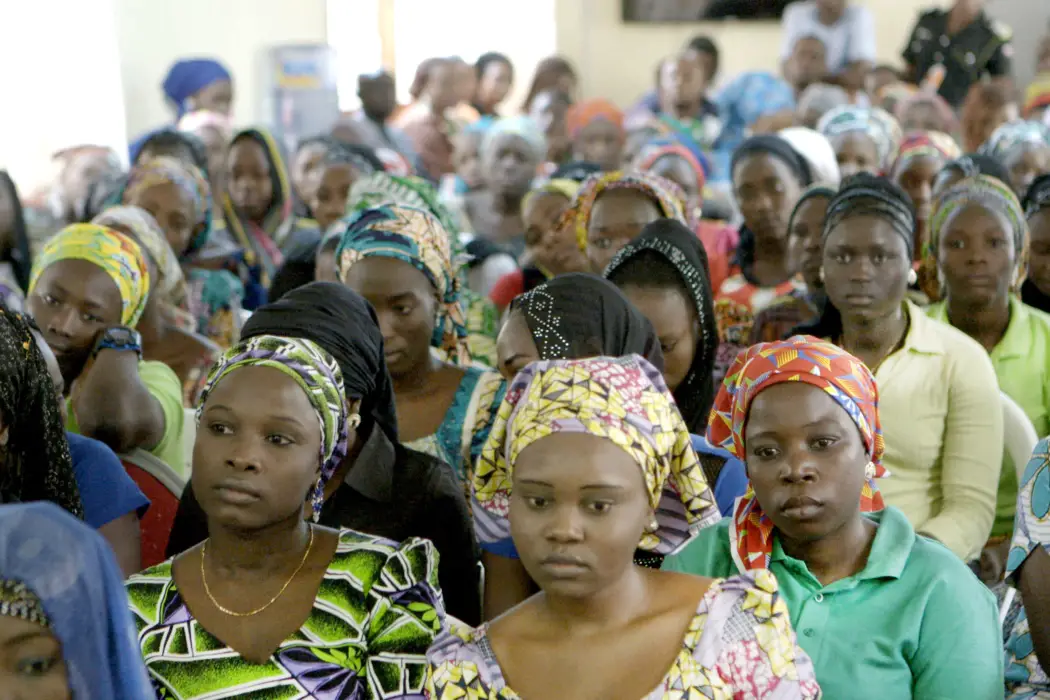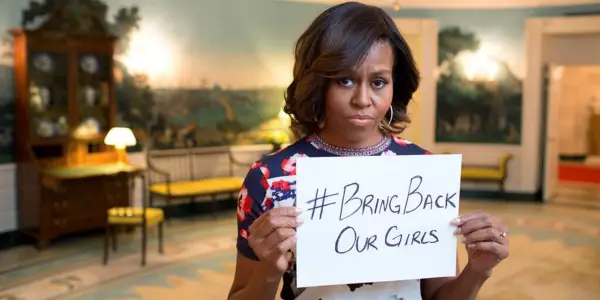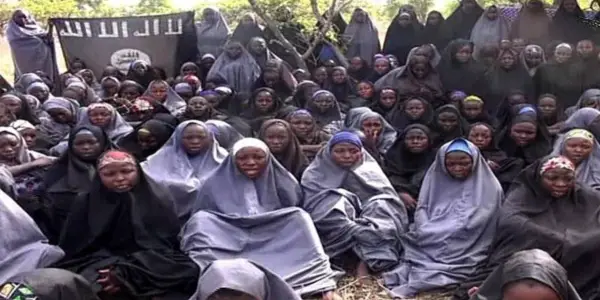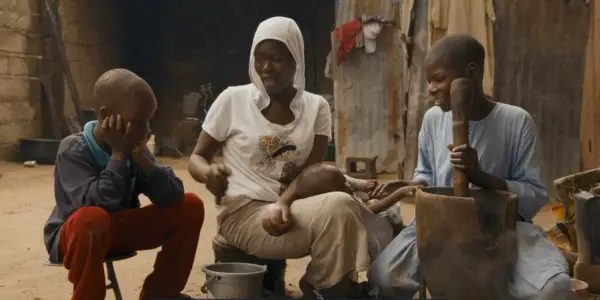STOLEN DAUGHTERS: KIDNAPPED BY BOKO HARAM: A Worldwide Cry For Women’s Rights

Amyana Bartley is a screenwriter and producer. Her company, Queen…
On April 14, 2014, a group of Boko Haram militants infiltrated a Chibok, Nigeria school for girls in the wee hours of the morning as the girls slept. A total of 276 girls, aged 16-18, were abducted and taken deep into the Sambisa Forest. The mass kidnapping soon sparked a worldwide movement, started by First Lady Michelle Obama, labeled #BringBackOurGirls. But what has happened for the girls since?
Stolen Daughters: Kidnapped By Boko Haram, directed and co-produced by Gemma Atwal, explores the history and current situation of the abducted girls and the continued presence of Boko Haram in Nigeria.
A Country in Turmoil
Nigeria’s government has struggled with corruption for decades.
According to OxFam International , it was estimated that by 2012, the republic had lost over $400 billion because of corruption since its independence in 1960. Boko Haram, translated by some as “Western education is forbidden”, first rose as an answer to all of the government corruption. But they soon became a far right, radicalized terror group. The widespread wealth inequity between Nigerians and its rulers is a big cause of the problem, as the average person lives in abject poverty, on around a dollar a day. Yet, five of it’s richest men have $29 billion between them.

Women represent between 60-79% of the rural workforce but are 5 times less likely to own any land, and of the poorest women, it’s estimated that 75% have never been to school. As usual, many women and girls here end up as spoils of war or are kidnapped and trafficked out as prostitutes.
Boko Haram’s birthplace and base are in the city of Maiduguri in Northeast Nigeria. Here many of its soldiers blend in with its regular residents. Though most of their families, friends and neighbors know what these soldiers do, they do not report them for fear of retribution.
The film goes back and forth between the cities of Maiduguri and at a government safe house in Nigeria’s capital city Abuja, where the released Chibok girls stay.
Abuja
It took three years for the Nigerian government to negotiate the release of just 103 of the kidnapped Chibok girls. Boko Haram and the government have been at war since 2009. May of 2018 marked the first anniversary of the first release of 82 Chibok school girls.
Aisha Al Hassan is the Nigerian Minister of Women’s Affairs and she oversees the safe house that these girls stay. She makes sure the girls have teachers, doctors and matrons that care for their day to day needs at the safe house. In the effort to make the girls as comfortable as possible, they also have staff who are Chibok and speak the girl’s native languages.

Though the girls get everything they need to rehabilitate here, they are not allowed to disclose their stories, as part of the agreement the government struck with Boko Haram. If Boko Haram was to find out that any of them spoke of what happened in the forests, the government fears the girls would suffer retaliation. Because of this, none of them could speak freely, however, a few of the girls shared their diaries with the film crew.
In the diaries, they spoke of their living conditions. They had no water source, hardly any food and the “rooms” constructed by tree branches and other makeshift tools from the forest didn’t hold all of them. Many had to sleep outside on the jungle floor with the ants, scorpions and snakes. A few tried to escape the camp but most were caught and met with unspeakable punishment or death.
The good news for the returned girls is that, after rehabilitation, the government pays for them to go to the American University of Nigeria(AUN) to finish their education. On the night of the abduction, 57 girls escaped being kidnapped. Of those 57, half are at AUN as well. Unfortunately, the government still has not negotiated the release of the other Chibok girls, but the negotiations continue to this day.
Maiduguri
About 524 miles Northeast of Abuja lies the city of Maiduguri, the birthplace of Boko Haram. It is a key battleground in Boko Haram’s fight to create their idea of an “Islamic” state, though their morals and principles are nothing close to true, peaceful Islam.
The Chibok girls are only a tiny percentage of the girls and children who are abducted by Boko Haram. In Maiduguri, hundreds of thousands of escapees are known as “Forgotten Women”. Even though they are taken against their will, when they return, they face rejection from their families and fellow citizens due to the stigma of rape and because many fear that, while they were in the jungle, Boko Haram was able to radicalize them.

Many of these women are forced to become suicide bombers against their will, because women, in general, are less suspected to be a bomber in the first place. Boys as young as 6 are stolen from, mostly murdered parents, to become trained in the radical ways of Boko Haram as soldiers.
Escapees in Maiduguri are freer to discuss their experiences in captivity. Along with the captive women’s “housekeeping” responsibilities, they are forced to help kidnap more girls. Girls who escape risk death, starvation and thirst. Some of them are first asked by their captors to marry them, and when they refuse, they are brutalized before being forced to marry.
One of the featured young women in the film is an 18-year-old escapee. Forced to marry a Boko Haram soldier, she was raped and impregnated before escaping. When she arrived home, she had no family left. Two young boys aged 9 and 12, orphaned by Boko Haram, clung to her as their “mother”. She took pity on them vowing to care for them both and her then 2-month-old son, only to find out that both she and her infant son were infected with HIV. Her infant son died just a few months later.
Stolen Daughters: Conclusion
Like my last review of City of Joy, a documentary on the massacres of the Democratic Republic of Congo, Stolen Daughters is a wake-up call for the world about another area of Africa riddled in war. Though the Chibok kidnappings had wider attention due to its hashtag started by Michelle Obama, half of the Chibok girls still are not free.
Millions of others have also been displaced from their villages across Nigeria, forced to move into the cities or refugee camps because of the nationwide terror inflicted by Boko Haram. Those who are kidnapped are in constant fear for their lives, not just from Boko Haram, but from the Nigerian government’s consistent air raids of Boko Haram camps. Nigeria has yet to negotiate a permanent peace agreement with Boko Haram, which means that millions are still suffering.
Through Stolen Daughters, we see yet another place in the world where women are being desecrated as spoils of war. Women, particularly women of color, are the most mistreated people in our world. They consistently take a backseat to their white sisters in priority. As in City of Joy, rampant racism is most likely the root reason why the people of Nigeria are not being helped by the worldwide community. Brown people are still, for the most part, not considered people and are left to suffer without consideration.
But with filmmakers like Atwal, who work to bring these issues to worldwide attention, there is still hope. We must be willing to face these atrocities and deal with them head-on. Collectively we have the power to change things. We have the power to make our governments sit up and listen. Awareness is the first step, but it means nothing without action behind it. It takes no money at all to write your representatives in government. If you’re able, donate to organizations who work in these countries of conflict every day. Make sure that the products you buy are made natural and conflict-free. Volunteer at local charities who help lift women of color in your neighborhood.
The bottom line is, change starts with us.
What would you do to help stop violence against women? Leave your comments below!
Stolen Daughters: Kidnapped by Boko Haram debuted on HBO October 22, 2018 and is available On Demand October 23, 2018.
Does content like this matter to you?
Become a Member and support film journalism. Unlock access to all of Film Inquiry`s great articles. Join a community of like-minded readers who are passionate about cinema - get access to our private members Network, give back to independent filmmakers, and more.
Amyana Bartley is a screenwriter and producer. Her company, Queen B. Productions, supports filmmakers of all walks, interested in creating thought provoking, moving projects. As her company grows, she will create "real jobs" for any talented artist, in front of and behind the screen, who is passionate about making a difference using the art of film.













